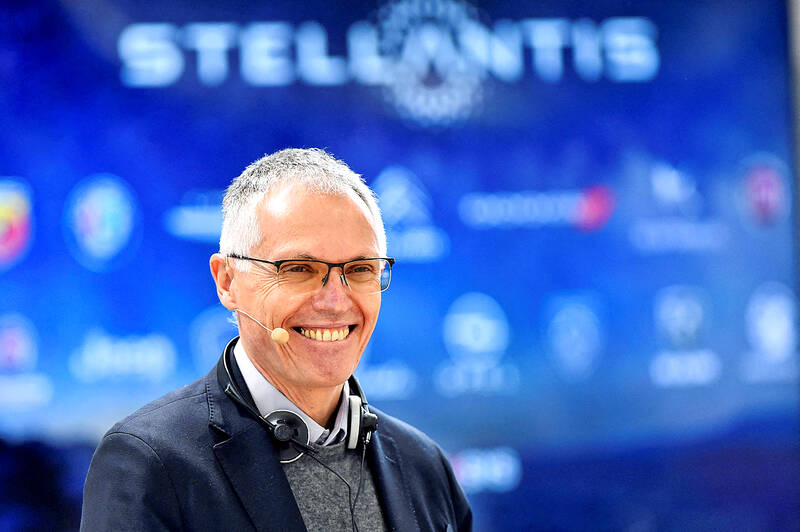Stellantis NV chief executive officer Carlos Tavares’ surprise departure leaves the maker of Jeep SUVs and Peugeot cars without clear leadership at a time of significant upheaval in the industry.
The company’s shares fell as much as 8 percent yesterday, and are down 45 percent this year, after the company said late on Sunday that chairman John Elkann would head an interim committee that is taking over from Tavares until a new CEO is found.
Stellantis is under pressure to halt a sales slide in the US and tackle overcapacities in Europe, where demand for electric vehicles (EVs) is waning just as Chinese manufacturers expand in the region.

Photo: Reuters
Tavares’ departure means the group is without leadership when “critical decisions” need to be made, Jefferies Financial Group Inc analysts led by Philippe Houchois said.
The CEO is leaving sooner than expected as his views on the automaker’s future differed from those of the board and some shareholders, the company said.
While Tavares had run Stellantis since it was formed in 2021 through a merger of PSA Group, parent of Peugeot and Citroen, and Fiat Chrysler, his drastic cost-cutting push in recent months sparked pushback from unions, dealers and managers inside the company.
Tavares is one of several industry executives who have come under pressure as automakers confront a slumping market that is struggling with an economic slowdown in China, flagging demand for EVs in Europe and the threat of tariffs as US president-elect Donald Trump prepares to return to the White House.
Nissan Motor Co chief financial officer Stephen Ma (馬偉誠) is also set to step down, people with knowledge of the matter said over the weekend.
While Tavares pledged fixes and moved to replace his finance chief and other executives, market share continued to decline in key markets, including France, fueling concerns over the automaker’s long-term prospects. The company on Sunday said it plans to name a new CEO in the first half of next year.
Swapping out the CEO and CFO in such a short time creates a “challenge” for investors, JPMorgan Securities PLC analyst Jose Asumendi said.
Investors are unlikely to price in significant earnings improvement for the next year until the management team is reset, he added.
After rising through the ranks at Renault SA under cost-cutting champion Carlos Ghosn, Tavares, 66, long impressed investors with his ability to turn around ailing automakers where others failed.
However, tensions escalated in recent months, with unions warning that the company’s cost-cutting course was leading to quality problems and delays in the rollout of key new models. In the US, dealers accused Tavares of damaging brands such as Jeep, Dodge, Ram and Chrysler.
“He won’t be missed in North America,” said Erik Gordon, professor at the University of Michigan’s Ross School of Business. “Not by the suppliers he fought with. Not by the dealers he fought with. And not by car buyers who ignored his vehicles.”

Taiwanese suppliers to Taiwan Semiconductor Manufacturing Co. (TSMC, 台積電) are expected to follow the contract chipmaker’s step to invest in the US, but their relocation may be seven to eight years away, Minister of Economic Affairs J.W. Kuo (郭智輝) said yesterday. When asked by opposition Chinese Nationalist Party (KMT) Legislator Niu Hsu-ting (牛煦庭) in the legislature about growing concerns that TSMC’s huge investments in the US will prompt its suppliers to follow suit, Kuo said based on the chipmaker’s current limited production volume, it is unlikely to lead its supply chain to go there for now. “Unless TSMC completes its planned six

Power supply and electronic components maker Delta Electronics Inc (台達電) yesterday said second-quarter revenue is expected to surpass the first quarter, which rose 30 percent year-on-year to NT$118.92 billion (US$3.71 billion). Revenue this quarter is likely to grow, as US clients have front-loaded orders ahead of US President Donald Trump’s planned tariffs on Taiwanese goods, Delta chairman Ping Cheng (鄭平) said at an earnings conference in Taipei, referring to the 90-day pause in tariff implementation Trump announced on April 9. While situations in the third and fourth quarters remain unclear, “We will not halt our long-term deployments and do not plan to

‘SHORT TERM’: The local currency would likely remain strong in the near term, driven by anticipated US trade pressure, capital inflows and expectations of a US Fed rate cut The US dollar is expected to fall below NT$30 in the near term, as traders anticipate increased pressure from Washington for Taiwan to allow the New Taiwan dollar to appreciate, Cathay United Bank (國泰世華銀行) chief economist Lin Chi-chao (林啟超) said. Following a sharp drop in the greenback against the NT dollar on Friday, Lin told the Central News Agency that the local currency is likely to remain strong in the short term, driven in part by market psychology surrounding anticipated US policy pressure. On Friday, the US dollar fell NT$0.953, or 3.07 percent, closing at NT$31.064 — its lowest level since Jan.

The New Taiwan dollar and Taiwanese stocks surged on signs that trade tensions between the world’s top two economies might start easing and as US tech earnings boosted the outlook of the nation’s semiconductor exports. The NT dollar strengthened as much as 3.8 percent versus the US dollar to 30.815, the biggest intraday gain since January 2011, closing at NT$31.064. The benchmark TAIEX jumped 2.73 percent to outperform the region’s equity gauges. Outlook for global trade improved after China said it is assessing possible trade talks with the US, providing a boost for the nation’s currency and shares. As the NT dollar